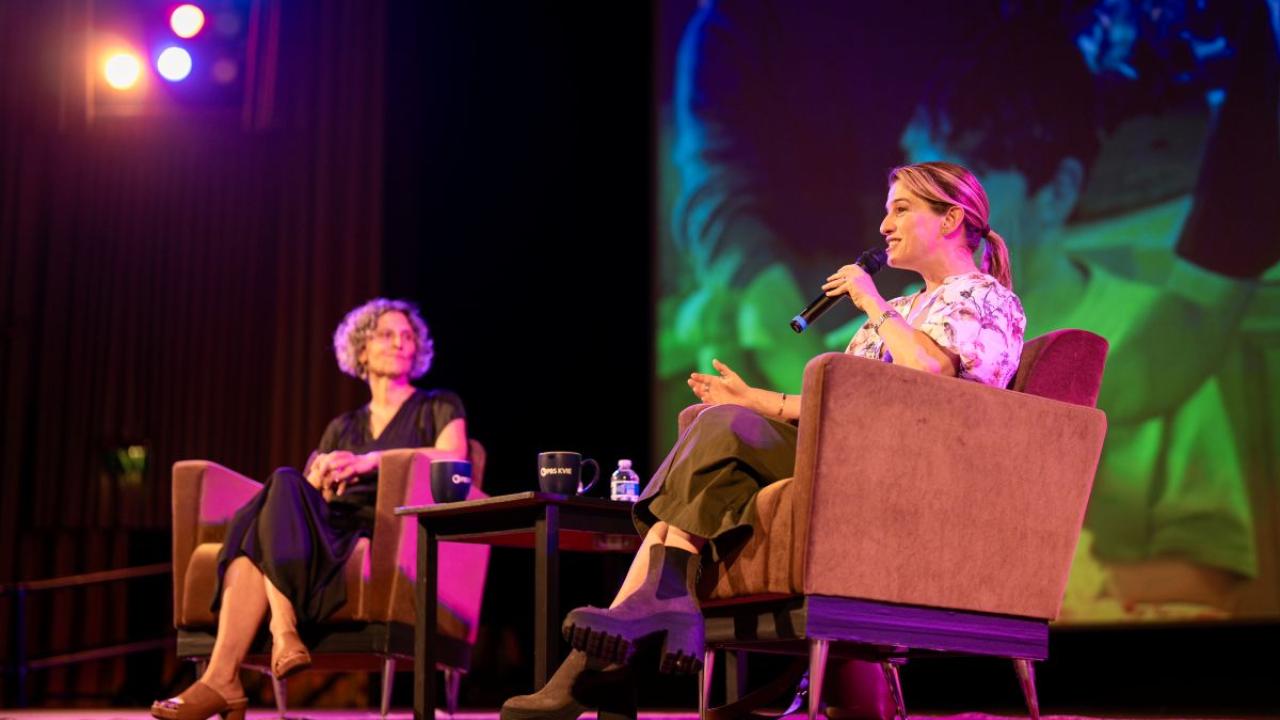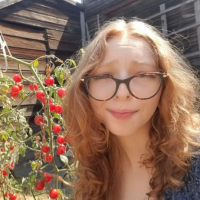
Pati Jinich: Connecting Cultures through Food
Nearly 800 food lovers gathered for a special conversation with James Beard Award-winning chef and Emmy-nominated host Pati Jinich. She is the culinary force behind Pati’s Mexican Table, La Frontera, and her newest series, Pati Jinich Explores Panamericana. Throughout the night, Pati captivated the audience with her bright-eyed curiosity, boisterous laugh, and infectious energy, sharing personal anecdotes that had everyone laughing while revealing her lifelong passion for cooking. Presented by PBS KVIE, the event celebrated the power of food to connect cultures and communities, even across borders
Moderating the event was Charlotte Biltekoff, Ph.D., Darrel Corti Endowed Professor in Food, Wine, and Culture at UC Davis, whose expertise bridges scientific and cultural approaches to food and health. Before entering academia, she worked as a cook in San Francisco and is the author of Eating Right in America and Real Food, Real Facts: Processed Food and the Politics of Knowledge.
A Kitchen as the Most Noble Place
Pati turned to Charlotte and joked, “I think I should be interviewing you with your background; we have so many similarities and connections.” Before cooking full-time, Pati studied political science, but ultimately pivoted careers after realizing she was not making the impact she wanted. “I could help everything Mexican be understood, loved, and appreciated,” she said, “I view kitchens as the most noble of places, and cooking as one of the most noble things you can do.”
When Charlotte asked Pati to share a childhood food memory, Pati recalled being the youngest of four daughters, helping her mom prepare huevos rancheros. “My mom was always an amazing cook, and I was always an amazing eater. One day, she let me make eggs.”
She remembers opening the spice cabinet in awe: “Oregano, star anise, ‘a star-shaped spice!?’, and canela.” She sprinkled them all in. “The eggs came out inedible, but it's always been a challenge to tame my enthusiasm!”
Rooted in Heritage, Open to the World
Pati also reflected on her Jewish-Mexican heritage and its influence on her relationship with food and identity. Growing up as one of two Jewish students out of 150 students in Mexico, she felt caught between cultures. Her family celebrated Jewish holidays alongside Mexican traditions. “Mexican Jews are not a concept that started 10 years ago. Mexican Jewish cuisine has been evolving for 500 years,” she said. She proudly identifies as Mexican and is grateful for the home Mexico provided her family.

Real Stories, Real Kitchens
On filming her shows, Pati emphasized authenticity. “I’m a really bad liar, and I didn't want to lie.” “It’s my real kitchen, my comal, and I’ve never had media training. I’m comfortable unscripted because everything in my kitchen has a story.”
Her relationship with her viewers has grown from the intimacy of her family's kitchen in Pati’s Mexican Table to the cultural exploration of La Frontera, where she shares the stories of the place her two most beloved countries meet. “We didn't want to talk about politics or the wall, we wanted to talk about the treasures given, like Caesar salad and margaritas, and show the people and how they live.” Her ability to instantly connect with people, combined with the magic of sitting at a table and sharing food, allowed these experiences to naturally bloom into rich, unforgettable stories.
She spoke about her latest project, “I'm so in love with Panamericana and exploring the Mexico I don’t know.” For Pati, each project is about understanding “the threads of our tapestry” and “the DNA of a place.” Her goal, she explained, is to walk in other people’s shoes and bring viewers with her, often to places few will go. “I believe in building bridges and finding common ground.”
Nachos, Salsa Macha, and the Food of the Future
When asked if there’s a particular borderlands food that captured this spirit, Pati shared the story of nachos, which were created at the border from Mexican corn chips and American Colby-Jack cheese. For her, nachos reflect the beauty of exchange and adaptation across cultures. “That’s why I have a problem with the word authentic. What is authentic to you may not be authentic to me.”
Audience questions from KVIE members covered misunderstood Mexican ingredients, such as nopales, which Pati considers the food of the future because they can be harvested all year round, her family's holiday favorite, carnitas, and dishes she hopes to master, including Asian cuisines. Pati also spoke passionately about her love of Salsa Macha and the joy of seeing viewers adapt her recipes into their own creations.
What’s Next For Pati
Charlotte wrapped up the evening by asking, “With your incredible body of work, is there something you've wanted to do but haven't?” Pati responded, “I felt like I had that hole before I did my Jewish Mexican episode. Now, I want to make it all the way to Argentina. I only hope I get the opportunity to continue.” She is currently planning season 2 of Panamericana.
Throughout the evening, Pati reminded us why public broadcasting matters. Her heartfelt storytelling showed that PBS is more than a free service; it's a bridge to culture, history, and human stories. Every dish tells a story, and every story is an invitation to understand the world a little better.
For those inspired to cook along with Pati, find her shows on PBS KVIE, follow her on Instagram, and explore her recipes on her website.
Look for more coverage at Aridged, highlighting this event and the region’s restaurant, education, and art scene.


Kaylianne Jordan is a junior transfer student studying Viticulture and Enology at UC Davis. She has a background in culinary arts and a passion for sustainable farming and enjoys exploring the connections between agriculture, winemaking, and community. Outside of college, she loves trying out new recipes, discovering local food spot
